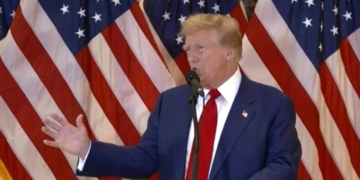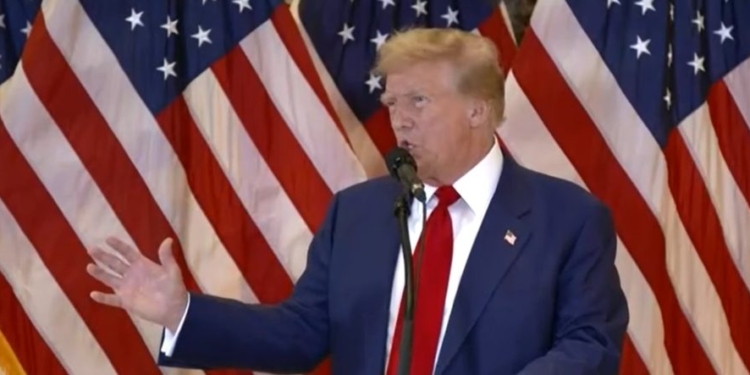Recently, former President Donald Trump stated his intent to “ask for the resignations of every single senior military official who touched the Afghanistan disaster,” tying back to his past comments from the summer to demand resignations from — or otherwise fire — generals and admirals who discredited their leadership by politicizing their mission.
Unsurprisingly, critics of the president from the Left miscast military depoliticization as intent to install “loyalists” into the higher ranks of the military. But a meaningful cull of senior officers would represent a modest yet critical component in any effort to restore the institutional integrity of our armed forces.
As an example of the dangerous politicization of the military, Vice Admiral Shoshana Chatfield once encouraged fellow servicemembers to be skeptical of laws passed by Congress because a high proportion of congressmen and senators are men. Air Force Major General Scott Cain published a “unity message” commenting on the death of George Floyd, inappropriately injecting his leadership at Eglin Air Force Base into a media-led cultural and political firestorm.
At a 2023 DoD PRIDE event, Lieutenant General DeAnna Burt, recognized by Defense Scoop as a trailblazer, decried supposedly “anti-LGBTQ” laws as detrimental to military readiness. From the Pentagon, in her Space Force uniform, Lt. Gen. Burt proclaimed that “gender-affirming” laws protecting children from sex change procedures were harmful to military readiness. Lt. Gen. Burt received a chorus of criticism from corners of Congress and online conservatives, but no formal admonishment for politicizing her service and parachuting herself into a heated political controversy.
The sentiment displayed by Chatfield and Burt is widely disseminated throughout military leadership. Lt. Gen. Ronald P. Clark, recently nominated for promotion to general and to be assigned commanding general, U.S. Army Pacific, Fort Shafter, Hawaii, has displayed leftist ideological allegiance. In 2020, Clark spoke at Duke, advocating for “diversity and inclusion in the top ranks” which will “require mentors in place, at the academy, visiting ROTC programs.”
In the same talk, he advocated for renaming bases and supported removing Gen. Robert E. Lee from recruiting materials. Two years ago, in a talk for Association of the U.S. Army’s Noon Report, Clark stated that diversity and inclusion was a “goal” of the Army.
Senior military leaders like these do not deserve to be promoted, even though they appear to be part of an increasingly liberal-leaning common trend among the military’s elite. According to research from the Center for Renewing America, over 42% of generals and admirals have publicly advocated for DEI as military policy.
Almost four dozen of over 500 generals have made their political beliefs a key component of their public identity, despite ethics and norms of public service demanding that they observe political neutrality and eschew partisan politics.
These political biases come at a time when our armed forces face a dual crisis of recruitment and readiness. The Army might make its recruiting goals in 2024 for the first time in three years, but only because it lowered its goals. According to the Wall Street Journal, less than 9% of veteran households want their family members to join the armed forces, a devastating development when one understands almost 80% of all recruits come from veteran families. An American Principles Project survey of recently separated and retired veterans revealed that over one-third of veterans do not want their children to serve because of politicized military leaders. The leftwing political agenda has alienated families that the military has traditionally relied upon to fill their ranks, fueling the recruitment crisis.
In his next term, Trump will have the right and duty to rectify this crisis of perception and competency by removing generals and admirals who have shown themselves unwilling to uphold, objectively, their oath of office. The politicization of officer service is more than enough reason for any president to make military personnel decisions. 18 USC Chapter 29, UCMJ Art 88, DODD 1344.10 establishes online activity as reasonable for scrutiny for the commander-in-chief to determine if politics have influenced an officer’s capacity to serve. This would not be a witch hunt, as leftist reporters might mispresent it, but a common-sense effort to keep politics out of the military.
The next Trump administration should select a secretary of Defense fully committed to this important task. Title 10, Code 526 gives the secretary authority to reduce the ranks of general/flag officers below the legally-defined minimum of 240. Only seven four-star generals fought World War II with almost 15 million active-duty soldiers. In 2024, with 1.3 million Americans on active duty, a roster of 42 four-star generals has created bureaucratic complexity for the sake of complexity. The explosive growth in the officer ranks has led to a top-heavy and clumsy institution.
The benefits in cutting the bloated numbers of generals extend beyond the purgation of leftist ideology and an increase in agility across the force. Military generals require significant financial commitments from the DoD. RAND estimates that the average O-7 general (one star) costs nearly $600,000 in salary, staff and allowances. The number rises to $3 million for O-10s (four stars). In some cases, certain O-10s can cost up to ten million dollars per year, purely because of their rank.
These expenditures are even more bewildering when so many of these ranks are surplus to the military’s current requirements. In World War II, the ratio of general/flag officers to active troops was 1:6,000; today it is 1:1,400. If Trump decided to pursue realignment of the combatant commands and cut the number of current general/flag officers to fit this ratio, he would immediately save up to $400 million.
In reducing the bloated officer ranks, the military can return to confronting actual threats, not in pushing Critical Race Theory, DEI or transgenderism. Perhaps then we can tackle the recruitment/retention and readiness crisis and restore the health and vitality of our armed forces under stronger, leaner and more competent leadership.
This effort could draw critics from both political parties as they rush to defend officers who are friends or who live in their states and districts, so the White House will need to become intimately involved in general officer promotions to ensure the integrity of future leaders and to return the armed forces to proper civilian control under political leadership chosen by the president and commander-in-chief, as outlined in a previous study.
With resolve and committed leadership, the next Trump administration will be able to return the officer corps to the standard professional ethic of the military essential to the conduct of war and the defenses of our nation.
Troup Hemenway is the President of Personnel Policy Operations and Founder of the Association of Republican Presidential Appointees. Will Thibeau is Director of the American Military Project in the Claremont Institute’s Center for the American Way of Life.
The views and opinions expressed in this commentary are those of the author and do not reflect the official position of the Daily Caller News Foundation.
All content created by the Daily Caller News Foundation, an independent and nonpartisan newswire service, is available without charge to any legitimate news publisher that can provide a large audience. All republished articles must include our logo, our reporter’s byline and their DCNF affiliation. For any questions about our guidelines or partnering with us, please contact [email protected].


























 Continue with Google
Continue with Google